
Robert L Note - In over 20 postings so far in this series, I have profiled 52 goaltenders in the Canadiens organization since 1909 ( See the sidebar links ). Some have been icons, and others were merely trivial and barely footnote worthy. This particular bio posting on Rogie Vachon owes a great debt to the work of T. C. Deneault of the Habs World blog. Deneault is a highly knowledgable Habs goalie enthusiast who wrote on Vachon last October in a piece entitled "The Man Who Would Be King". The bio you are about to read is borrowed from that post.
While moving chronologically along through the Canadiens history, I have finally arrived at my era, and one of my personal favorites - Rogie Vachon. My attachment to Vachon began in 1969 when he tended goal as the Habs won the Stanley Cup.
I had a Canadiens sweater at 8 years old, and I cut up an old white bedsheet into the numbers 2 and 9, for my mother to sew onto the back of my jersey in Vachon's honour. It made playing street hockey all the more fun. When I played a bad game, friends called me Rob, but when I won I became "Rogie".
Little did I know that Vachon was no longer wearning the number 29 by then, and had switched to number 30, and would soon wear number 1. I always found that ominous and very eery when Ken Dryden came along to steal his thunder while wearing that number 29 that today hangs high in the Bell Centre rafters.
And I never forgave Dryden either!
Some of my fondest memories of youth were the table hockey games my older brother and I used to partake in. What we'd do, in a preclude to fantasy hockey and pools, was to choose 4 teams, each with a full line and give them NHL team names. It was always the Canadiens, Bruins, Red Wings, and get this - the Minnesota North Stars!
We'd play our contests against a timer, stopping only to record goals and assists quickly scribbled, tallying up the totals as games, and season passed. We'd do a short regular season, then a playoff pitting the top 2 teams against each other.

My brother and I would each own a team and the other two would comprise names pulled from a hat. As my brother was much older, he always allowed me the first pick - Rogie everytime!
We would battle pretty hard on this old table hockey game, often breaking a sweat. Though my bro was 8 years my senior, I won more than my fair share. I was better, and even better with Rogie as my stopper, it seemed!
Long before there was a Rollie the Goalie - it was Rogie the Goalie in my young world.
I would have been more crushed when Vachon was "given away" to the Kings in late 1971 - a blow only slightly softened by my Habs being Cup Champions and the emergence of a radical, book worming, lanky hippie named Ken Dryden, who began to take hold of my goalie imagination.
Heck, I had his jersey even!
My brother moved off to college soon after and our table games remain to this day a fond memory forever attached to the name Rogie Vachon. I imagine that if that frozen time had brought on a Table Hockey Hall Of Fame, Vachon would be the same slam dunk names such as Richard, Gretzky and Lemieux were in the real world!
Last year when Vachon turned 62 on September 8, Montreal Gazette and Habs Inside Out columnist Dave Stubbs put together an excellent piece on Rogie's career. The article/birthday present made a great case for Vachon's inclusion in the real Hockey Hall Of Fame.
Rogie is a sentimental favorite of both Mr Stubbs and yours truly, and I believe that hockey fans can make a difference in getting Rogie elected to the Hall. Heck, if we can come within a few week's votes of getting Rory Fitzpatrick into an All Star game, then anything is possible - especially the sensible.
Instead of putting a player unworthy of such an accolade in a position of embarrassment, fans of hockey could unite and feel wonderful about helping to bring an honour to someone who earned it and then some.
I am calling on the more popular hockey blogs and their creative genius to give this rally a boost. Perhaps if sites such as Kukla, Mirtle, Off Wing and other popular sites could entice readers to write to the Hall Of Fame and get Rogie included on the ballot, the idea might hit it's stride.
Any fan can help bring a player up for nomination by writing to Jim Gregory, who is the Selection Committee Chairperson for the Hall at: BCE Place, 30 Younge St.
Toronto Ont, M5E 1X8. Support your letter with a strong case for his consideration.
As Dave says, "All letters are circulated to the 18 member selection committee.
Should a name be backed by even one member of the committee, a file is prepared, distributed, then discussed and voted upon at an annual meeting. With 75 per cent support of the 18 voters, a candidate is elected."
Read Dave Stubbs' piece here at Habs Inside Out.

Rogie Vachon was born on September 8th, 1945 in Palmarolle, Quebec, a small town about fifty miles north of Rouyn-Noranda. One of eight children, Vachon grew up on a dairy farm.
It didn’t take long for Vachon to make an impact as a young goaltender. At the tender age of sixteen, Vachon was playing junior hockey in Montreal. Recommended to the Canadiens by Gilles Laperriere (Jacques older brother), there wasn’t a spot for Vachon on the Montreal Junior Canadiens, so he played with the Montreal NDG Monarchs in 1963-64. The following year saw Vachon split his time between the Junior B squad in Thetford Mines and the Junior Canadiens.
The process of making it through the Canadiens minor league system was a long and arduous process for Vachon. In the days before expansion the Canadiens farm system consisted of many minor league clubs spread throughout North America. Needless to say there were many goalies spread throughout, and with Vachon’s lack of height and size, the odds of him making it to the Canadiens were long indeed.
In order for Rogie to make the team he needed to prove himself at all the different levels of the Canadiens chain. For Vachon this began a lifelong battle for recognition, one that he would have to battle throughout his professional career and beyond. Despite all he had achieved, there was never a sense of having made it, there always seemed to be something to prove; to others and to Rogie himself.
In 1965-66, Vachon was able to win 25 of his 39 appearances in Thetford and was named a first team all star. The Canadiens decided to turn Vachon professional later that year when he played ten games for the Quebec Aces of the American Hockey League.
At the onset of the 1966-67 season, Vachon found himself as the backup goaltender for the Houston Apollos of the Central Hockey League. The Apollos at that time were the Canadiens top farm club and were populated with such future Canadiens stars like Serge Savard and Jacques Lemaire. Backing up Gerry Desjardins in Houston, Vachon saw his path to the Canadiens blocked not only by Desjardins but by the tandem of Gump Worsley and Charlie Hodge in Montreal. Worsley had led the Canadiens to the Stanley Cup the last two years and Hodge after winning the Vezina trophy in 1964 shared it with Worsley in 1966.

If an aspiring fiction writer came up with a story of Vachon’s 1966-67 season it would be written off as not being believable. And though Vachon would go to enjoy many successes later on it was this particular season that in many ways was Vachon’s most memorable.
In the fall of 1966 Vachon attended his first Canadiens training camp before being assigned to Houston. The 1966 preseason saw the Canadiens dominate, winning eight of their ten preseason games. One of their losses was a 4-2 defeat to their top farm team in Houston, anchored by the first star of the game; Rogie Vachon.
In the course of the 1966-67 season in Houston, Vachon outplayed Desjardins to become the Apollos starter. In 34 games with Houston he won 17 games, lost 12, and tied 5.
Vachon’s future with the Canadiens was forever changed by a rare visit from Montreal’s general manager Sam Pollock to Houston at the turn of the year. Coming off two Stanley Cups the Canadiens found themselves struggling with mediocrity throughout the fall of 1966 and the early weeks of 1967 as Worsley was injured and Hodge struggled to stay consistent.
“When I went down to our top farm club (Houston), I saw three games,” recalled Pollock later on. “And our young goalie, Rogie Vachon was sensational all three nights, the best player on the ice. It wasn’t a difficult choice really. Vachon was the guy who looked like he could help us the most. You can never have too much goaltending, so we made the decision and up he came.”
On February 18th, 1967 Rogie Vachon made his NHL debut on a Saturday night against the Detroit Red Wings. Making a first save against Wings legend Gordie Howe proved to be a big boost to his confidence. Later in the game he would stop Frank Mahovlich on a breakaway. Despite being outshot 42 to 34 by Detroit, the Canadiens won 3-2 behind the stellar goaltending of Vachon, who was named the games first star.
Almost overnight, Vachon was transformed into the Canadiens newest and brightest star, as Vachonmania gripped Montreal in the spring of 1967. In the nineteen games he played with the Canadiens that spring, Vachon won 11 games, lost 3 games, and tied 4, with one shutout, and a 2.54 goals against average as he led the team to a second place finish.
“Before Rogie came along, we had been playing like a sick team,” remembers Yvan Cournoyer.
“But when he joined the team, he seemed to change our luck real fast. It was like, you know when you’re sick, and the doctor gives you the pill. Well, Vachon was our little pill. When he came along, we felt better all of a sudden.”

It was all upwards from there as Vachon went onto post a record of 11-3-4 in 19 games, with a 2.48 GAA. In consequence, he became Blake's go to man for the playoffs where he defeated the Rangers in the first round.
Prior to the Stanley Cup final, Maple Leafs coach Punch Imlach, who had more than the odd trick up his sleeve, termed Vachon as a Junior B goalie that would not beat Toronto. After splitting the first four games of the finals, Vachon gave up four goals in the first two periods of the crucial game five at the Forum, and was pulled for Gump Worsley. Part of the reason for Vachon’s failure to complete his own personal Cinderella story was that the workload had finally caught up to him as he had grown increasingly tired. Vachon played well, but the duo of Johnny Bower and Terry Sawchuk were superior and the Leafs got the silverware. The quote likely didn't get into Vachon's head as much as Bower's prowess made the Habs shake their's.
Despite the disappointing end to his dream season, Vachon had established himself as an NHL goaltender and never played another game in the amateurs. In that summer’s expansion draft Charlie Hodge was chosen by the Oakland Seals and Vachon was now entrenched as the Canadiens number two goaltender behind Gump Worsley. His overall season performance was remarkable enough to qualify him for the Calder Trophy as Rookie of the Year, which ended up going to Boston's Derek Sanderson.
In 1967-68, Vachon and the Habs got off to a horrible start in the first season of expansion. After 33 games, the Canadiens were dead last in the East Division and couldn't seem to find a groove. Things began to change for Vachon and the Habs with a 2-2 come from behind tie against the Leafs on December 27. They would win the next two games, tie the third, and then launch off on a 12 game win streal that propulsed them into first place.
During the 21 games, starting with the Leafs contest, Vachon allowed an incredible 15 goals in 21 contests, and the turnaround season ended with the Canadiens recapturing the Cup. Vachon would go on to win 23 games for the Habs but was only able to see action in two playoff games as Worsley was in the nets as the Canadiens won the Stanley Cup.

The following year 1968-69 saw Vachon begin to establish himself as the Canadiens main man in the nets. In 39 regular season contests, Vachon excelled he and shared the Vezina Trophy with teammate Gump Worsley that season. Their goals against mark of 2.26 was the league's best since 1958-59.
Come playoff time, Vachon once again found himself watching Worsley from the bench as the Canadiens swept past the Rangers in round one. However, in game three fortune smiled on Vachon, as Worsley broke his finger and had to be replaced.
Given the opportunity, Vachon went with it and over the next eight games won seven games, only lost one, with a miniscule goals against average of 1.42. The Canadiens went on to beat the Bruins and then sweep the Blues to win another Stanley Cup.
Vachon had finally earned his share of Stanley Cup glory. Vachon it seemed, had taken his rightful place as the heir to the great Canadiens goaltending tradition. Little did anybody know at the time, but Vachon had played his last playoff game for the Canadiens.

When Worsley suffered a nervous breakdown and moved out of Montreal in 1969-70, Vachon inherited the starting job full time in Montreal. He played well, but the defending champions struggled in a tight dividion and missed the playoffs despite a 92 point season. Vachon and Phil Myre were the tandem that season, and received perhaps their unfair share of the blame.
Undoubtedly making matters worse was the performance of Tony Esposito in Chicago. Let go by the Canadiens and picked up by the Chicago Black Hawks in the interleague draft, Esposito had one of the greatest seasons in goaltending history. Esposito set a modern day NHL record with 15 shutouts, won the Calder and the Vezina trophies and was the runner up in the voting for the Hart trophy. For Vachon, this meant the subtle beginnings of the seeds of doubt by others that would spell the end of his tenure with the Canadiens.

Starting the 1970-71 season, the Vachon and Myre duo were adequate if unspectacular. Though Vachon's numbers were up to par (23-12-9, 2.65), the Canadiens were disatisfied, and called up Ken Dryden late in the season to see what he could bring.
Dryden would play the final six games, winning each one, while allowing only 9 goals against. The rest as they say, is history - and so was Vachon in Montreal.

The following season, a frustarted Vachon requested a trade after he allowed four goals in his only period of action. Deep down Vachon probably realized that his goaltending future no longer rested with the Canadiens. Vachon had wanted to go to Toronto to play for the Leafs, however, with Bernie Parent and Jacques Plante sharing the goaltending duties, Toronto weren’t interested at that time. Instead, the Canadiens traded him to Los Angeles on November 4th, 1971 for Denis DeJordy, Dale Hoganson, Noel Price, and Doug Robinson. It was akin to a new lease on life for Rogie.

In 1972-73 the Kings improved by 24 points as Vachon posted a 2.85 goals against average. The next year the Kings advanced to the playoffs and played the Chicago Black Hawks in the first round. Despite Rogie posting a 1.75 goals against average, the Hawks won in five games.
The 1974-75 season would be the highlight of Vachon’s tenure with the Kings. The Kings set a franchise record with 105 points and finished fourth overall in the league standings. The franchise also scored at the gate outdrawing the NBA’s Los Angeles Lakers for the first time. In the 54 games he played, the Kings won 27, lost 14, and tied 13. Rogie had a goals against average of 2.24 and was easily the most popular athlete in Los Angeles.
“I felt like I was a pioneer,” says Vachon. “When I came to L.A., the team was so bad that we were out of the playoffs by Christmas. It was a joke.
Vachon was reborn as a number one goalie and went on to enjoy some of his finest seasons while helping the Kings become a more competitive hockey club. He recorded 32 of his 51 career shutouts in L.A. and was a two time selection to the NHL Second All Star Team. Vachon became the most popular figure in franchise history and was selected the team's most valuable player four times in five years between 1973 and 1977.
The steady Gary Edwards served as Vachon's backup during these years and they gave the Kings one of the rosiest goaltending pictures in the NHL. In 1974-75 the Kings set a franchise record with 105 points and a fourth place finish in the NHL's overall standings. That season, Vachon's 1.41 goals-against mark in the first 17 games represented the best start in the league since Jacques Plante's fine beginning in 1957-58. Unfortunately, the Kings were eliminated in the first round by Toronto. The Kings never did excel in the post-season despite Vachon's brilliance between the pipes.
Unfortunately, for the Kings, all the gains of the 1974-75 season would be overshadowed by a first round playoff exit at the hands of the Toronto Maple Leafs. Although Rogie would shoulder the blame for this loss, his 2.11 goals against average was nothing to be ashamed of. The main culprit of the Kings playoff disappointment was an offense that could only score 6 goals in the three game series.
Rogie would have to console himself with being named the Hockey News player of the year and finishing second in the voting for the Hart trophy.
The 1975-76 season would see the Kings dip down to 83 points and to 6th overall in the NHL standings. Surprisingly, the Kings would advance past the first round of the playoffs by sweeping the Atlanta Flames in a best of three series in which Rogie only gave up only a single goal. In the second round, the Kings bowed out to a tough Boston Bruins team, taking them to a seven game limit. Once again Rogie performed impressively with a playoff goals against average of 2.33, but the Kings lack of offence did them in again. In the seven games against Boston the Kings could only manage 14 goals. Rogie had little room for error on a team so lacking in punch.

Vachon's finest hour came as Team Canada's goalie in the inaugural Canada Cup tournament in 1976. Since Ken Dryden and Bernie Parent were unavailable, Vachon, Gerry Cheevers and Glenn Resch were invited to compete for the job. Vachon emerged with the hot hand and played every one of his team's games. His spectacular play helped Canada to the championship and resulted in his selection as the team's most valuable player.
Rogie did not disappoint, and turned in one of the greatest goaltender performances in International hockey history. Vachon went all the way for Team Canada, playing all seven games and winning six, registering two shutouts, and posting a goals against average of 1.39 for the entire tournament. While he was named Team Canada's MVP for the tournament, the honour of tournament MVP oddly went to Bobby Orr. Many saw the emotional decision as a slight to Vachon's contribution.

1976-77 for the Kings was a virtual repeat of the year before, as they once again finished 6th overall and beat the Flames in the first round of the playoffs before bowing out to the Bruins in the second round. The following year saw the Kings once again qualify for the playoffs, but lose in the first round to the Toronto Maple Leafs.
In the summer of 1978 Vachon left the Kings as one of the games first free agents, signing a deal with Detroit that made him the highest paid goalie in the NHL. Vachon was sought out as a saviour for the Wings, who had plummeted greatly as were now as weak as the Kings were when Rogie first headed west.
The signing did not work out as planned for either party. As compensation for signing Vachon, the Wings were required to forfeit Dale McCourt - a rising star slow to meet expectation. McCourt, irronically apply named, took the matter to court, and remainded with Detroit. The Red Wings then had to comply by surrendering players that were not in their best interest. The overall effect of McCourt staying when he was in fact not wanted, combined with the Wings surrendering assets they did not wish to part with resulted in disastrous consequences for the team.
Midway through the second year of his contract, Rogie was traded to Boston. After two solid years with the Bruins, Rogie packed it in following the 1981-82 season with a career goals against mark of 2.99. During his three decade career, Vachon played in 795 games, winning 355 and tying 127. Vachon returned to Los Angeles in 1983-84, where he went on to serve as coach, general manager and chief hockey operating officer.

The Kings honored their popular puck stopper by retiring his number in January 1985. In 1983, he became the GM of the Kings, aposition he held for eight seasons. Along the way, he was involved in one the greatest trades in NHL history, oversseing the details when team owner Bruce McNall bankrolled the aquisition of Wayne Greatzky in 1988. He retired as general manager in 1991 but returned to the Kings a short time later as assistant to the club president.
Often, it is Gretzky himself who is credited with popularizing hockey in California. Long before the Great One, it was Vachon who held fort, keeping the Kings a viable franchise for seven seasons. Joined three seasons later by Marcel Dionne, the two teamed to keep hockey alive in Los Angeles. Without them, Gretzky would not have had a franchise to popularize.

During his three decade career, Vachon played in 795 games, winning 355 and tying 127. After retiring, he served in a variety of executive positions with the Los Angeles Kings.
Vachon remain' one of the games most overlooked canadidates for the Hockey Hall Of Fame. His exclusion, as the last remaining playing goaltender link to the Original Six era, is a shame that should be corrected in time.
Vachon's achievements were numerous:
Named to Quebec Junior Hockey League All-Star First Team, 1965-66.
Shared Vezina Trophy with Gump Worsley, 1967-68.
Member of Stanley Cup champion Montreal Canadiens, 1968.
Member of Stanley Cup champion Montreal Canadiens, 1969.
Member of Stanley Cup-champion Montreal Canadiens, 1971.
Played in National Hockey League All-Star Game, 1973.
Named Los Angeles Kings' Most Valuable Player, 1972-73.
Named Los Angeles Kings' Most Inspirational Player, 1972-73.
Winner, Los Angeles Kings Most First Stars Award, 1972-73.
Named Los Angeles Kings Most Valuable Player, 1973-74.
Winner, Los Angeles Kings Most First Stars Award, 1973-74.
Played in National Hockey League All-Star Game, 1975.
Named to National Hockey League All-Star Second Team, 1974-75.
Named Los Angeles Kings' Most Valuable Player, 1974-75.
Winner, Los Angeles Kings Most First Stars Award, 1974-75.
Runner-up (to C Bob Clarke) in Hart Trophy balloting, 1974-75.
Starting goaltender for Canada Cup-winning Team Canada, 1976.
Named Most Valuable Player, Canada Cup, 1976.
Named to Canada Cup All-Star Team, 1976.
Named to National Hockey League All-Star Second Team, 1976-77.
Named Los Angeles Kings' Most Valuable Player, 1976-77.
Named Los Angeles Kings' Most Popular Player, 1976-77.
Played in National Hockey League All-Star Game, 1978.
And did you know that...
To relax for games, Rogie would watch TV quiz shows to sharpen his mind and increase concentration.
Another of Rogie's nicknames was "Bono", due to Fu manchu moustache and his resemblace to Sonny Bono.
Whether starting or not, Rogie would always take the first warm-up prior to games.
Rogie would rewrap his stick after every period, and would not use his game stick in warm-ups or practices.
Rogie's number #30 sweater was retired by the Los Angeles Kings on February 14, 1985, the first retired in club history.










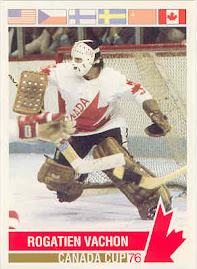
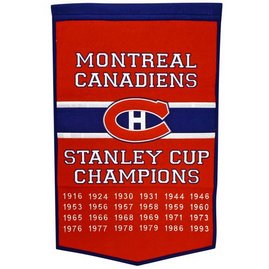







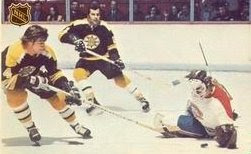



















































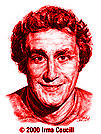



































































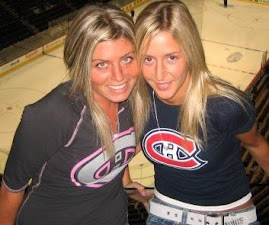
















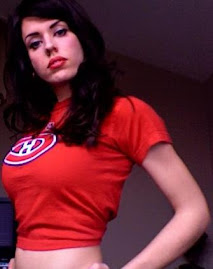

No comments:
Post a Comment